#cornsheller
Text

JM Series: Tame Your Toughest Terrain! Ideal for mulching grass, shrubs & branches (up to 6cm) in vineyards, orchards & more. (40-60 HP tractors)
🌐 : https://www.lanceragrico.com/crop-residue-managment/jupiter-jm
📞 : +91 88 99 33 55 33,
📩: [email protected]
.
.
.
.
.
#jupiter#JupiterMedium#multure#shredder#flailmowers#cornsheller#farmer#lanceragriculturemachine#farming#farmingtools#farmingequipments#lanceragrico#gujarat
0 notes
Link
Peter Toland, 29, of Cornshell Fields, Londonderry, is the owner of Luna the dog, who had to be put down.
0 notes
Text
I900R MANUAL LAWN >> DOWNLOAD LINK
vk.cc/c7jKeU
I900R MANUAL LAWN >> READ ONLINE
bit.do/fSmfG
canon ultrasound probes
canon aplio i700 user manual
canon i seriescanon smi
canon ultrasound machine price
canon aplio i900
toshiba ultrasound machine
The Kodak ScanMate i900 Series Scanners are designed to meet worldwide underneath the scanner cover and push up on the module to. User Manual: Craftsman 917272761 917272761 CRAFTSMAN LAWN TRACTOR - Manuals and Guides View the owners manual for your CRAFTSMAN LAWN TRACTOR #917272761. 5 smart maps to visualize and quantify shear wave propagation in realtime, including new variance map; One shot or continuous mode scanning; Push pulse are listed in a separate manual that comes with the printer's interface module. dot matrix printer with a double-sided bidirectional push-pull tractor. User Manual: Craftsman 917271631 917271631 CRAFTSMAN LAWN TRACTOR - Manuals and Guides View the owners manual for your CRAFTSMAN LAWN TRACTOR #917271631. Cornshellers , hand . Mowers ( lawn ) and grass catchers . Mills , cane . Mills , cider . Machinery , ensilage - cutting , Description I900 . 1890 . 1. Remove the yellow "Step 3" sticker. from your scanner. · 2. Look for the unlocking screw at the. bottom of the scanner. · 3. Using a screwdriver, push and turn.Manual. View the manual for the Samsung Omnia SGH-i900 here, for free. This manual comes under the category Smartphones and has been rated by 1 people with
https://regocosag.tumblr.com/post/691812662120775680/farenhyt-ifp-100-manual, https://regocosag.tumblr.com/post/691812662120775680/farenhyt-ifp-100-manual, https://regocosag.tumblr.com/post/691812662120775680/farenhyt-ifp-100-manual, https://regocosag.tumblr.com/post/691812662120775680/farenhyt-ifp-100-manual, https://regocosag.tumblr.com/post/691812662120775680/farenhyt-ifp-100-manual.
0 notes
Text
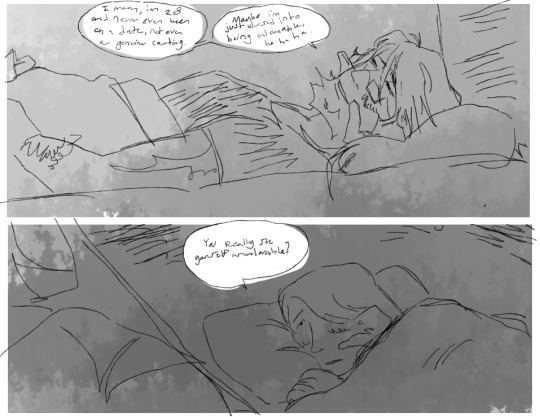
every time i draw ruyan laying on a cot i get bad memories of camping on those uncomfortable things and how much nicer it always is to just sleep on the rocky floor than feel like a cornshell is holding you up on metal rigging
#every time i draw ruyan on a cot its dueing the CT expedition to be clear#ruyan otherwise would sleep in a bed while ryder sleeps in the bath tub of their mir dhonan inn#or: in a tree. thats a thing ryder learned to do#ruyan of azim#ryder of nowhere
8 notes
·
View notes
Text
I know Dick is with Barbra now...woohoo whatever and I know Zatanna is pursuing other endeavors like Kaldur decided to do...but do you think yah know before they were solidified Dick and Zatanna ever yah know...
crunched the cornshell together
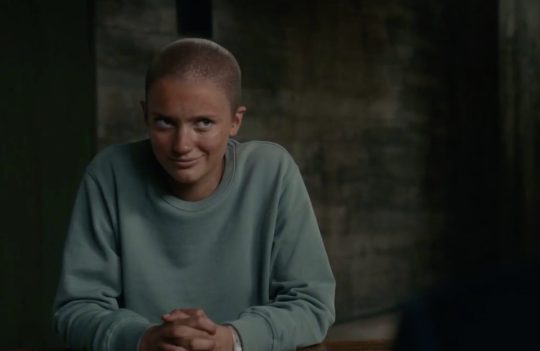
just for old times sakes
#we never got enough dick zatanna content#also i love barbra she is gem and QUEEN but#i kinda am wondering if stafire will ever make an appearance#no tea no shade but all offense#nia binges#nia rambles#Young Justice#yjs3#idk they are just such good besties i wouldnt want them together now#but still
6 notes
·
View notes
Text
Victorious: the breakfast bunch is peak comedy n like 50 yr old adults who r mad abt it up on youtube bc “these kids dont understand the og movie n they ruined it” r so dense considering it’s a affectionate parody its not supposed to be deep n the man who made that show n the ep is as old as y’all so chill
9 notes
·
View notes
Text
i was tagged by the lovely @jensrolt 🌸💗💞 thank you for the tag fae!
appearance
I’m over 5’5’’ ((of course i had to google how much is that alskdjdj)) // i wear glasses // contacts // i have blond hair // i prefer loose clothing to tight clothing // i have one or more piercings // i have at least one tattoo // i have blue eyes // i have dyed or highlighted my hair // i have gotten plastic surgery // i have or had braces // i sunburn easily // i have freckles // i paint my nails ((sometimes)) // i typically wear make up // i don’t often smile // i am pleased with how i look ((uhh depends on the day)) // i prefer nike to adidas // i wear baseball hats backward
hobbies & talents
i play a sport // i can play an instrument // i am artistic // i know more than one language // i have won a trophy in some sort of competition // i can cook or bake without a recipe // i know how to swim // i enjoy writing ((but don’t ask me to do it in any language other than spanish)) // i can do origami ((i used to know how but i forgot)) // i prefer movies to tv shows // i can execute a perfect somersault ((no way)) // i enjoy singing // i could survive in the wild on my own // i have read a new book series this year // i enjoy spending time with friends ((oh god i miss them so much, haven’t seen them in like 7 months)) // i travel during school or work breaks ((not that i have many breaks tho)) // i can do a handstand
relationship
i am in a relationship // i have been single for over a year // i have a crush // i have a best friend i have known for ten years // my parents are together // i have dated my best friend // i am adopted // my crush has confessed to me // i have a long-distance relationship // i am an only child // i give advice to my friends ((it’s my thing ;)) // i have made online friends ((yes and i love them so so so much 💜)) // i met up with someone i have met online ((i wish someday i can, although i’m so far away from most of them))
aesthetic
i have heard the ocean in a cornshell // i have watched the sunrise // i enjoy rainy days ((especially summer thunderstroms 🤩)) // i have slept under the stars // i meditate outside // the sound of chirping calms me // i enjoy the smell of the beach // i know what snow tastes like // i listen to music to fall asleep // i enjoy thunderstorms // i enjoy cloud watching // i have attended a bonfire // i pay close attention to colors // i find mystery in the ocean // i enjoy hiking on nature paths // autumn is my favorite season
misc.
i can fall asleep in a moving vehicle // i am the mom friend // i live by a certain quote(s) ((kind of)) // i like the smell of sharpies // i am involved in extracurricular activities // i enjoy mexican food // i can drive a stick-shift ((i don’t know how to drive yet asfjklsd)) // i believe in true love // i make up scenarios to fall asleep // i sing in the shower ((i used to but not anymore)) // i wish i lived in a video game // i have a canopy above my bed // i am multiracial // i am a readhead // i oen at least three dogs // i used to have a cat
tagging @earthling-isa @alexiaugustin @engelkeijsers @kesdebues @noramachwtz @merldruck and whoever else wants to do it! of course feel free to ignore as well 💘
#*tagged#*tututalks#tagging people always makes me feel like i’m annoying#but also i love getting tagged so#i hate and love these games at the same time
4 notes
·
View notes
Video
#corn #cornsheller #oldfarmequipment #farm #farmlife #farmer #farmequipment #barnfind #barns #barn #architecturalsalvage #squarenailarchitecturalsalvage #illinois https://www.instagram.com/p/CEN2B31ny13/?igshid=cwx7g7628rhk
#corn#cornsheller#oldfarmequipment#farm#farmlife#farmer#farmequipment#barnfind#barns#barn#architecturalsalvage#squarenailarchitecturalsalvage#illinois
0 notes
Note
So.. by 'soft-shell' taco, you mean just a normal taco in an actual tortilla? Like how they actually are? Also sorry if this sounds snarky, I just get annoyed by the term 'soft-shell' in terms of tacos.
Yeah I hate the term too but I never knew there was a different one. But yeah, in an actual tortilla not those weird-ass cornshell things
7 notes
·
View notes
Video
youtube
Maize Sheller | Maize thresher | Tractor PTO driven Corn Thresher
#MaizeThresher #MaizeSheller #CornSheller
Tractor PTO driven Maize Thresher/Corn Thresher (Shelling)
It threshes maize grain.
Threshing Capacity: 5 to 6 ton maize grain per hour
PTO power from 50 Hp tractor
Video by: CSISA, CIMMYT International
नङ्ग्यिएको मकैका घोगा छेडाउने ठूलो ट्याक्टरबाट चल्ने ठूलो थ्रेसर
एक घण्टामा ५ देखि ६ टन मकैको दाना दाउन सक्ने
For more Information: Drop inquiry in comment sections.
0 notes
Text

Effortless Shelling: Let the machine do the hard work! Simply feed in your unpeeled corncobs, and watch as the sheller separates kernels with ease. Save your energy for what matters most - managing your farm and enjoying the fruits of your labor.
🌐: https://www.lanceragrico.com/harvesting/threshing-maize-sheller
📞 : +91 88 99 33 55 33,
📩: [email protected]
.
.
.
.
.
#threshing#maizesheller#harvesting#corn#cornsheller#indianagriculture#farmer#lanceragriculturemachine#farming#farmingtools#farmingequipments#lancer#lanceragrico#agritools#india#gujarat
0 notes
Photo

What’s better than a #tacotour? Having a #tacobuddy join you! @E2TheBam recommended I try tacos along with my 1st huarache at Huaraches Doña Chio! The Marinated #Chickentaco was great!👌🏼 The lengua was tender, moist & tasty. #Delicious! Hands down. But the huarache was mouthwatering good! Each bite got better! Kudos to Huaraches Doña Chio for serving fresh, scrumptious, authentic tacos with handmade cornshells! However, on a beautiful day like today, Elliot and I didn’t let the #TacoTour end there. On our way to @BegyleBrewing we stopped by @ThreeLeggedTacos truck and their tofu and chicken tacos are unique and jam-packed with spice & flavor! Yummy! Thanks for joining me, @E2TheBam! I look forward to our next stop! #TacoTuesday #TacoTruck #Tacos #Huarache 🌮🌮 https://ift.tt/2WbDZQs
0 notes
Photo

What’s better than a #tacotour? Having a #tacobuddy join you! @E2TheBam recommended I try tacos along with my 1st huarache at Huaraches Doña Chio! The Marinated #Chickentaco was great!👌🏼 The lengua was tender, moist & tasty. #Delicious! Hands down. But the huarache was mouthwatering good! Each bite got better! Kudos to Huaraches Doña Chio for serving fresh, scrumptious, authentic tacos with handmade cornshells! However, on a beautiful day like today, Elliot and I didn’t let the #TacoTour end there. On our way to @BegyleBrewing we stopped by @ThreeLeggedTacos truck and their tofu and chicken tacos are unique and jam-packed with spice & flavor! Yummy! Thanks for joining me, @E2TheBam! I look forward to our next stop! #TacoTuesday #TacoTruck #Tacos #Huarache 🌮🌮 https://ift.tt/2WbDZQs
0 notes
Photo

What’s better than a #tacotour? Having a #tacobuddy join you! @E2TheBam recommended I try tacos along with my 1st huarache at Huaraches Doña Chio! The Marinated #Chickentaco was great!👌🏼 The lengua was tender, moist & tasty. #Delicious! Hands down. But the huarache was mouthwatering good! Each bite got better! Kudos to Huaraches Doña Chio for serving fresh, scrumptious, authentic tacos with handmade cornshells! However, on a beautiful day like today, Elliot and I didn’t let the #TacoTour end there. On our way to @BegyleBrewing we stopped by @ThreeLeggedTacos truck and their tofu and chicken tacos are unique and jam-packed with spice & flavor! Yummy! Thanks for joining me, @E2TheBam! I look forward to our next stop! #TacoTuesday #TacoTruck #Tacos #Huarache 🌮🌮 https://ift.tt/2WbDZQs
0 notes
Text
Ok, so, I need to get this out while I can still remember my dream from last night/this morning cuz my dreams have been absolutely wild lately.
Ok, so my dream starts with me and some guy (no idea who the FC is) as enemies on a game-like battle field and we are constantly finding ourselves both attracted to and killing each other. Just like a game, we both keep coming back, sometimes in different scenes until, eventually, we finally were able to break the cycle and actually remember and realize that we are pitifully in love with each other.
I was trying to communicate with someone I was writing/collabing with on this apparently transdimenional notebook where we could communicate on literal paper but things got so confusing and frustrating I just asked the guy if he used discord. lol
Anyways, someone tried desperately to try and keep me from seeing my soldja boi, going as far as drugging me, locking me away in a room thats like 3rd story up complete with those window wrought-iron bars. I could see the street outside lines with reds, oranges, browns, ambers, golds and yellows... And there was this amazing fantastical bridge connected to the building I was in with a gated under pass. There was a lot of activity going on and I was trying to get a glimpse at the king and the soldiers riding underneath.
The inside of the room was sterile white with clean edges and designed to look like a desifner beach home, complete with super lush carpet and house sandles and a sweet smell in the air. Sure 'they' kept trying to scrub my memory, but I had died so many times that my brain was beyond their control. They couldnt scrub my memories no matter how much they tried.
So I managed to break out and it was a fight. I ran and ran through some... banquet halls, I guess. Lots of corridors and large, festive rooms- I'm certain I ran past or through at least one wedding. lol I remember at least one wan in a Wedding gown XD
Once I finally found my Soldier, I was ecstatic. I remember jumping up to the loft above me to have him catch me by my waist and hoist me up. We were both quite thrilled, as one can imagine, to finally be together again.
And so we end up escaping that world somehow and ending up on some other planet....that resembled a corn shelled taco?!?? Literally, that was a very specific thought and memory in the dream that connects to nothing else. lol
So me and this hot soldier guy in fantasy style armour land on this cornshell planet. We are Queen and King of this lively odd ball of a planet and everything is going fine..... until half the population falls gravely ill and it was up to me to take on the incredibly dangerous task of getting the cure.
I had to take my awesome hover bike (think something along Atlantis) to this big HQ under cover because there is a special tree that apparently hold tge cure. I attempted to pull it up until I realized I could not damage its roots. So I break out a shovel and now Im a target.
I manage to squeeze my way inside this massive trench I dug to uncover the roots and to remain hidden cuz this thing is more like an island than a tree! It's absurdly huge!
Unfortunately, I did get caught and killed at least one time during this attempt and I came back for more. I wish I could remember what else happened and that I could recontinue the dream cuz I swear my brain write entire novels for dreams.
@howlofthewolf @libbleslie I think y'all might especially enjoy this wild ride.
0 notes
Text
Blind Tom (1849-1908) - A Musical Genius
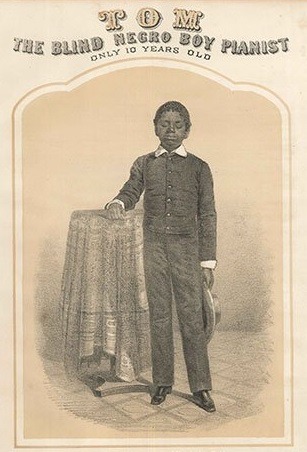
Tom, The Blind Negro Boy Pianist, Only 10 Years Old
1860
Published by Horace Waters, American, 1845 - 1949
Source: The Columbus Museum
http://columbusmuseum.pastperfectonline.com/webobject/65B3999F-ED18-442F-B4BD-105893291758
http://columbusmuseum.pastperfectonline.com/webobject/3A436838-E702-4DB0-847C-263880565314
The Smithsonian National Museum of African American History and Culture has a such artifact in their collection which served as the portrait cover for some of Tom’s sheet music.
Thomas Green Bethune was born his mother Charity Wiggin’s 12th (or 14th) of 18 children on May 25, 1849 (according to one source) on the “Solitude” plantation of a General James N. Bethune northeast of Columbus, Georgia.
However, when Charity was sold to Bethune at a slave auction in 1850, Tom was actually gifted with her for “nothing” on account of his blindness.
His father Domingo Wiggins was also purchased at auction and worked in the fields on the plantation. Tom’s parents were married at the time.
Tom was actually fortunate to survive into adulthood as Deirdre O'Connell shares the following in her book The Ballad of Blind Tom , Slave Pianist: America's Lost Musical Genius:
Many disabled infants born into slavery were killed by their masters with as little thought as a practical farmer might give to drowning a runt or shooting a horse with a shattered leg.
O'Connell also notes that some disabled children of slaves survived only because their owners believed they could be sold to freak shows at a profit, as in the 1852 case of conjoined twins sold for $10,000 in North Carolina.
In his 1866 textbook on mental deficiency Idiocy: and its Treatment by the Physiological Method, French Physician Edward Sequin wrote his observations of the boy:
He is from birth nearly absolutely blind, not seeing enough to direct his walk. He appears first, in his unwritten legend, at the age of fifteen months, standing up by supporting his hands on the knees of his young master, and following with the movements of his body the modulations of the flute with which the lad was whiling away the blank hours of a Georgia plantation.
Till 5 or 6 years old he could not speak, scarce walk, and gave no other signs of intelligence than this everlasting thirst for music but at 4 years already, if taken out from the corner where he lay dejected, and seated at the piano, he would play beautiful tunes; his little hands having already taken possession of the keys, and his wonderful ear of any combination of notes they had once heard.
People flocked for miles to hear him, till the Southern insurrection put a stop to his success...
He is led by the hand or sleeve before an audience, and begins by presenting himself in the third person, and in a few words thrown away, rather than spoken, saying, “Blind Tom will play this or that piece for you,” etc., after which he begins the piano.
One newspaper account reported:
His memory is so accurate that he can repeat, without the loss of a syllable, a discourse of 15 minutes length, of which he does not understand a word. Songs, too, in French or German, after a single hearing, he renders not only literally in words, but in notes, style and expression.
An article n the Ledger-Enquirer Sunday Magazine by S. Louise Bing in 1965 states:
"He was a human mockingbird. The sound of the cornsheller delighted him; any sound in fact, and he could reproduce these sounds faithfully . . . When about 7, Tom began to compose on the piano his own melodies. A part of the house had a low roof and when it rained - the sound of raindrops there was very distinct. Here, Tom loved to hover and listen. "The result was 'Rain Storm' which became a great favorite." (to future audiences)
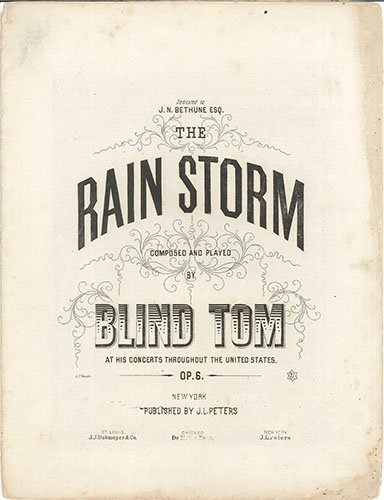
youtube
When Tom was about at the age of 8, Bethune decided to hire him out to Perry Oliver’s freak show. Tom was a sensation.
This led to a tour of not only Southern cities, but major Northern ones as well, such as New York, Philadelphia and Pittsburgh. During this time, Tom was separated from his family and performed four shows every day in hundreds of cities across the nation.
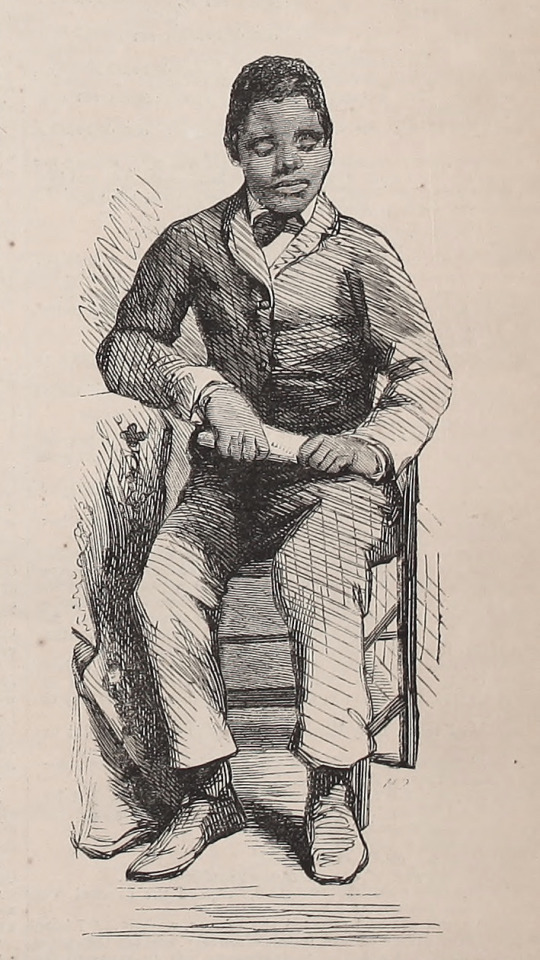
Blind Tom at age 10 in Frank Leslie’s Weekly, March 3, 1860
At age 11 in 1860, Tom played at the White House before President James Buchanan - the first black performer to do so.
As related by Dr. Trefferet of the Wisconsin Medical Society:
Several musicians, who felt Tom had tricked the public and the President, tested him at his hotel the following day. They played two completely new compositions. The first, 13 pages in length, Tom repeated from beginning to end without effort or error, and the second, 20 pages in length, he also played to perfection.
In 1862 Tom performed an even more amazing feat. He was asked to play secondo while the composer of a 14 page original piece played treble. This meant he had to improvise the entire secondo part in step with the musician’s execution of the first part. Never having heard the piece before, Tom sat beside the composer and played the first note to the last in secondo part. Following that, he “fairly shoved the man from his seat and proceeded to play the treble with more brilliancy and power that its composer.” A report of that event concludes “to play secondo to music never heard or seen infers the comprehension of the full drift of the symphony in its current—a capacity to create, in short.”
He was referred to in the press as “the greatest pianist of the age whose skills surpassed Mozart.”
The widespread success in these places persuaded Bethune to take Tom to Europe, where, for more than three years, he appeared in concerts in England, France and Scotland. Tom was 16 when he went on a world tour in 1866 to display his talents. Most notably, he traveled to England, Scotland, France, and Canada. He is even known to have played before royalty (whomever that might be).
While in Paris, he had surgery on his eyes, but it did very little for him, helping him to only dimly distinguish objects.
He returned to the United States and continued to play for packed venues.
Sequin outlined that Tom’s vocabulary was less than 100 words, but his musical repertoire was over 7000 pieces.
In Philadelphia, a panel of 16 prominent musicians signed this statement about Blind Tom:
“Whether in his improvisations of performances of compositions by Gottschalk, Verdi, and others, in fact in every form of musical examination-and the experiments are too numerous to mention-he showed a capacity ranking him among the most wonderful phenomena in musical history.”
This information was quoted in part from an article on page S-15 of the Ledger- Enquirer dated Sunday, April 23, 1978.
The Following Contains Excerpts From The Book
The Marvelous Musical Prodigy, Blind Tom, The Negro Boy Pianist, Whose Performances at the Great St. James and Egyptian Halls, London, and Salle Hertz, Paris, Have Created Such a Profound Sensation
Published in 1867 by Sun Book and Job Printing Establishment and made available in digital form online by The American Printing House for the Blind, Inc., M.C. Migel Library
(This text has been faithfully and painstakingly transcribed here with slight differences in punctuation and in spacing alone. Italics are exactly as they originally appear. More can be found here.)
TESTIMONIALS ON BLIND TOM
[From the Commercial]
Pittsburgh, April 6th, 1866
In compliance with the request of the manager of ‘Blind Tom,’ who states that doubt is sometimes expressed in regard to the early, development of ‘Blind Tom's’ wonderful ‘musical talent,’ I would state that, in the year 1853, at which time I was residing in Columbus, Georgia, this boy (at that time about four years of age) was brought to my notice under the following circumstances: - While engaged in looking over some music, in company with a Professor of Music, in a music store, this boy was brought in by Mr. James N. Bethune (an old and respected citizen of that place), who stated that he believed this child to possess extraordinary talent. From the appearance of the boy, the Professor was somewhat skeptical, but determined to give him a chance.
I lifted him to his seat at the piano; he played several pieces. The Professor then performed a piece of his own composition, not at that time published. To my surprise 'Tom' played it immediately after him, demonstrating at once, possession of wonderful and mysterious knowledge of music. At that time he was entirely blind, apparently idiotic, and displayed the same restlessness of body as at present. Upon expressing my astonishment at his evident genius, the Professor shrugged his shoulders, and said, ‘mere imitation; no progressive talent.’ I expressed my conviction to him that, if the boy lived, he would become the musical wonder of the world.
Removing from that section, I saw no more of 'Tom' until April 6, 1866. He remembered the incident, and played for me the same piece, composed by the Professor, which he performed at that time, thirteen years before.
- GEORGE A. KELLY
Pittsburgh, Pa
LETTER FROM I. MOSCHELES
In justice to Blind Tom, I have much pleasure in stating that I think him marvelously gifted by nature. I happened to be present at a performance - of his at Southsea, and at the request of the Manager, began to test his abilities by extemporising a short rhythmical piece which he imitated to perfection, thus proving beyond all doubt that he did not impose on the public by preparation. I then went so far as to play him that part of my ‘Recollections of Ireland’, in which the three melodies are blended, and even that he imitated with most of its intricacies and changes.
Having tested his powers of analyzing chords, and found them all that I could desire, I next put my hands on the keys at random, and was surprised to hear him name every note of such flagrant discord. Tom's technical acquirements are very remarkable, and his entertainment full of interest for the musician and amateur.
I. MOSCHELES
Southsea, September 11th, 1866
N. B. - I. Moscheles was the preceptor of Mendelssohn and Thalberg.

Carte-de-visite of Thomas Wiggins, also known as Blind Tom, Full length portrait of Blind Tom; young man seated holding up sheet of (music?) paper in right hand; "Rain Storm" in large block lettering near top
ca. 1865/1870
Photographer: Washington L. Germon (1821 - 1877)
W.L. Germon's Temple of Art, 914 Arch St., Philadelphia (PA)
Tom is holding a version of his first composition at the age of 5.
Source:
Beinecke Rare Book and Manuscript Library at Yale University
Randolph Linsly Simpson African-American collection
http://discover.odai.yale.edu/ydc/Record/3520809
http://brbl-dl.library.yale.edu/vufind/Record/3520810
A similar artifact can be found in the Collection of the Smithsonian National Museum of African American History and Culture.
Yet another one is in the Collection of the Columbus Museum.
“BLIND TOM'S” CONCERTS
Pianoforte and Music Warehouse,
1 and 2 High Street, Montrose, Scotland
Permit me to call your attention to the concerts of Blind Tom," a negro boy pianist, of extraordinary and unaccountable musical powers. On Friday and Saturday last I had the pleasure of hearing him play in the Assembly Hall, and I cannot refrain, especially as I have no professional connection with him, from informing such of the musical public of Montrose and its vicinity, as have not already heard him, that the performances of this blind negro are so wonderful that no one possessed of musical taste should lose an opportunity of listening to them.
I may say, without the slightest exaggeration, that Tom's execution of all kinds of music— from the most classical works of Beethoven, Bach, Mendelssohn, and others, down to the simplest plantation melody of “the Sunny South" is unsurpassed by that of the best professional performers of the day.
Blind Tom's last appearance in Montrose will be this evening, in the Assembly Hall, at eight o'clock, when he will again play classical selections from - Beethoven, Mendelssohn, Bach, Mozart, &c. His pianoforte solos will be taken from the compositions of Thalberg, Liszt, Chopin and others. He will also sing various songs from popular operas, and ballads from Moore and Bums, as well as some of his own composition.
As a proof of his extraordinary musical gifts, Blind Tom invites any member of the audience to play any piece of music unknown to him, and he. after a first hearing, re-plays it with the most perfect accuracy, however intricate or elaborate in harmony. He can also analyse any chord or discord struck on the- instrument, if he is within hearing, naming almost as rapidly as they are struck, each individual note. As an additional proof of his remarkable powers of imitation, he gives recitations in Greek, Latin, German, French, as well as imitations of the Scotch bagpipe, the musical box, the hurdy-gurdy, the Scotch fiddler, the American stump orator, comic speakers, and, in short, any sound he may hear.
I am, your most obedient servant,
JOHN LAW.
December 31, 1866
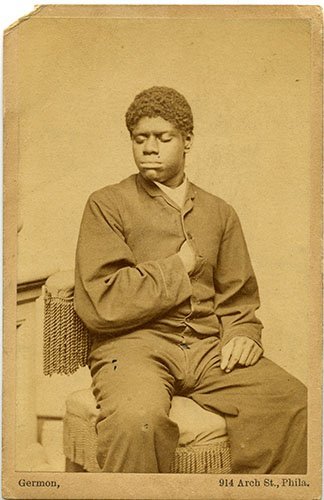
"Blind Tom" Wiggins
ca. 1865
Photographer: W.L. Germon
Source: Columbus Museum
http://columbusmuseum.pastperfectonline.com/webobject/9DCD3E30-5E23-45E2-B4D5-824126094076
OPINIONS OF THE ENGLISH AND AMERICAN PRESS
AMERICAN
[From the Philadelphia Inquirer, 27th December, 1865]
Blind Tom. — One peculiarity about this extraordinary genius is, that although uncouth as he appears, seemingly holding all national attributes in obedience, he has the power to draw around him the elite of the city. Men of intellect, men of mind, all go to see Tom— not to witness his antics, not to listen to his imitations, but to be astonished, confounded, and amazed, at the effect he produces on the piano. His notes are so thrilling, and his execution so perfect and so startling as to amuse every listener. The piano itself seems gifted, and sends forth in reverberation, praises, as it were, to Blind Tom. There is music in all things, but Blind Tom is the Temple wherein music dwells. He is a sort of doorkeeper besides, and when he opens the portals, music seems to issue forth to wake the soul to ecstasy.
[From the Public Ledger, September 27th, 1868
Musical Genius — Blind Tom. — At first view such a phenomenon as Blind Tom might seem one of the most humiliating facts to the musical world that can possibly be conceived. Here is a blind, half-witted black boy, who cannot speak, in private, without stuttering, who cannot remain quiet for five minutes, whether on or off the stage, but must keep tumbling and jumping, or rather spinning round and over, hardly like a human being at all ; and yet this half-idiot looking boy has powers as a musical performer, such probably as no one has ever attained by any amount of art or practice. Many Professors of Music of great eminence have been ready, after listening to him, to declare that they would never touch the piano again. What he has done in public in the way of playing the most difficult pieces after hearing them but once, and with a perfection that years of practice could not usually apply, are known to all the lovers of music in this city.
The secret of this wonderful power is the most perfect ear for the harmonies of sound ever observed— ‘only this, and nothing more’. To him everything is music. Discords do not seem to disturb him, but his ear catches every harmony, and his whole being seems entranced and controlled by it. Let him stand with his back to a piano, and any number of chords be struck, and he will instantly tell every note sounded, showing that he has been able to discriminate, and his memory to retain distinctly and perfectly each sound. The Phrenologists say that memory is in proportion to clearness and strength of the impression produced at first, and this must be the case with him. From two years old this remarkable power of sound over him has been noticed. He has been blind from birth, and it would seem here, as often observed before, that, by a compensative law of our being, in proportion as one sense is defective, the expenditure of vital energy thus saved is absorbed by some other sense. Probably all our sensations are the result of vibrations, and the pulsations of light that usually enter and give all their exquisite pleasure through the eye-ball, are in his case compensated for by the pulsations of sound, which strike on an ear possessed of nerves of double delicacy and vital energy from the absorption and concentration of two senses in one.
Blind Tom is not, however, the senseless being that most imagine him, but rather like one completely guided and governed by this one sense alone. As a lad, the song of a bird would lead him to wander off into the woods, and then the "sound of the flute would bring him to those who went in search of him. His great desire now is to go to Europe in the spring, and have a brass band. But his ear finds music in all sounds. As a lad, his mother beating the other children, and all her harsh words and their cries would be to him a source of exquisite pleasure, the whole sounds being reproduced, the scolding, the beating, and the crying, by his Imitative power, and remembered word for word, and note for note. As the snake which charms the bird with its eye is itself charmed by the power of sound, so is he under the same sort of control of this most wonderfully developed sense. It would, perhaps, be worth trying whether the same tension and perfection of the nerves of the ear could not be temporarily produced by the use of the Indian extract of hemp.
Perhaps a proper study of the case of this lad might show to what extent all (though in less degree) might be educated through music. It is certainly this alone that can be most easily developed; probably the highest and best emotions might be thus permanently excited within him, while the desire for those pleasures leads him to put forth intellectual efforts that nothing else can. It was thus he taught himself the piano, from hearing the young ladies of Mr. Bethune's family play their music — a power that first developed Itself, to Mr. Bethune's astonishment, at midnight, one night when, the house and piano having been left open, he crept into the parlor (then being quite a child) and awoke the family by playing their most difficult pieces. By degrees he was called in, as a curiosity, to play when white visitors came to the plantation; and at last the sound of carriage-wheels always brought him to the house. His clappings at his own performances, and glee at each now feat, now show the simplicity of his name. But his performances in music show how the highest results of art and study are most easily reached by this lad in his one-sided culture and development — that of the ear alone. It is with him a sort of inspiration. The science of music he will probably never be able to master. But we must remember that the art of it preceded the science in Egypt, in Palestine, in Greece, and in Rome, by long ages. Indeed, it was the music of the Hebrews, and then of the Christian Church, that gave birth to scientific music, and alone developed it, until that of the opera gave rise to a distinct branch of the culture. This reacted powerfully on sacred music itself. Blind Tom at present likes operatic music best. Though he loves the organ somewhat, he probably seldom goes near any church, where, indeed, his presence would soon disturb any congregation.
[From the Albany (N. Y.) Argus, January, 1866.]
"Blind Tom”, the Negro Pianist.— We yesterday were so fortunate as to attend a seance given by “Blind Tom”, the negro pianist, at Hidley's music room. As an exhibition of incomprehensible genius, excelling in its simplest, manifestations the triumphs of severe art, we never saw the performances of this prodigy equaled.
A wild, uncouth figure, angular at all points which should be curved, and curved at all points that should present acute lines — loose-jointed, close-wooled, thick-lipped, sprawl-footed, with forehead almost covered with kinky locks, eye-balls prominent and distended, and an idiotic, staring expression of countenance — in short, a regular specimen of the African in his unadulterated and barbarous condition, before be has been elevated by the influence of social surroundings or Caucasian infusion.
Such is Blind Tom as he first strikes the eye and impresses the mind of the observer. You ask the genial Georgia gentleman who accompanies him what history he has, and when you learn that he was born a slave on a plantation, and brought up a chattel, you feel that he is just about what other “niggers” might be, who were “developed” under the same circumstances. But a street car with a tinkling bell passes up the street. Instantaneously a new sort of intelligence flashes over the black face. The attention is fixed, and mind seems really awaking from the ashes of idiocy. “What note is that, Tom?” “C sharp," is the reply, without a second's pause. You test the sound at a piano, and find the lad correct. He has reached by lightning process of intuition what you can determine only with scientific aids. Or without giving any premonition of your design, you walk to a piano, and strike a dozen or twenty notes of the most difficult and intricate combinations, rapidly as possible. "What notes are those, Tom?" asks the agent, and with voluble rapidity, the transformed idiot repeats them, each by name, without a single error. You seat the ungainly figure at a piano-stool. He is to be tested now in his perception of music. All negroes have a love for melody, and acquire wonderful proficiency in rendering it; but the negro does not understand classical music. Does he not?
Try this one. Here is a classical production— the “ Sonata Pathetique” of Beethoven, covering eight or ten pages, and ask any young lady who fancies she has graduated at the piano, whether it is difficult or not. “We will have this Sonata, Tom,” says the musical director to his loose-fingered, thick-lipped protege, and instantly the wonderful process of interpretation begins. This blind boy, who never saw a note of music in his life, plays you the entire work, while musical critics follow him with eyes and ears, and he makes no mistake—not one false register, or slur, or discord, or omission.
Most wonderful, truly; but wonderful simply as a feat of prodigious memory, thoroughly disciplined— proving nothing of instinctive apprehension. No, but let your Albany Professor sit down at the piano and improvise. He does so; a difficult conception, which he himself could not render twice, and which it would take you twenty-four hours to commit. Meanwhile, Tom grows most strangely / antic. He throws himself into grotesque shapes, like an automaton at a fantocini show. He claws the air with his hands, whistles through his teeth, capers about and see-saws up and down. The professor has finished, and with a mumbling remark, “That is jest as ea-sy!” Tom seats himself, and imitates the improvisation, note by note, perfectly; then gives his own idea of it, and accompanies that with variations. So, tested with a dozen pieces, he renders them at once upon hearing them. This is proof of intuition.
Now test the power of analysis. Three pianos are opened; at two of them persons present hammer away, with the design of producing the most perfect discord imaginable; at the third piano the professor makes a run of twenty notes. The confusion ceases and Tom repeats in a moment each of the twenty notes sounded. Still another test. Tom takes the stool himself. With his right hand he plays “Yankee Doodle” in B flat. With his left hand he- performs “Fisher's Horn-pipe” in C. At the same time he sings “Tramp, Tramp,” in another key-maintaining three distinct processes in that discord, and apparently without any effort whatever.
“Most marvelous,” you say, “but can he express as well as he perceives?" The gentlemanly director will let you see. He asks Tom to render “Home, Sweet Home”, by Thalberg, You know that of all productions in the current repertoire, there are none which have finer or more difficult shades than this. Blind Tom proceeds, and were you to close your eyes you could not tell but Thalberg himself was at the instrument, so perfect and so exquisite is the conception and the touch. Then you have renderings in imitation from Chopin, from Gottschalk, from Vieuxtemps, from anybody you will mention who has been deemed a master of the art. And you turn away convinced—surfeited with marvels, satisfied that you have witnessed one of the most incomprehensible facts of the time.
Some curious metaphysical questions grow out of these remarkable demonstrations. What is this boy? A negro— belonging to an unintellectual race; himself an idiot. But what is intellect and what is idiocy? Can he be an idiot with whom those achievements are most ordinary which in others are pronounced the grandest evidences of masterly genius? And what is it to be “developed”? Where is the narrow dividing line that separates the philosopher from the fool? Here is a monstrosity— a gorgon with angel's wings; a sunflower with the blush of a mignionette and the fragrance of a mountain rose. There is no law by which to measure and determine such exhibitions as this.
Meanwhile, we only state what we saw in all its astonishing features, and leave our readers to determine for themselves whether the Chinese transmigration theory is correct—whether the soul of some unfortunate defunct musician, misbehaving on earth, has been banished into the awkward and angular body of Blind Tom.
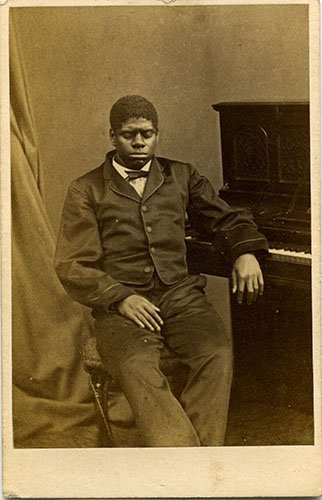
"Blind Tom" Wiggins
1866
Photographer: Adolphe Nadin
Source: Columbus Museum
http://columbusmuseum.pastperfectonline.com/webobject/F174E0FD-2D9F-4F8E-BB26-385118838815
ENGLISH
[From the London Times, August 18th, 1866]
St. James' Hall.— For some time past the wonder-seekers of London have been amused by a series of performances, vocal and on the pianoforte, by a negro boy called Blind Tom. The boy, who is not only blind, but completely and unmistakably idiotic, executes difficult music with a facility that under the circumstances is remarkable, and goes through several feats which rather indicate mnemonic and imitative powers than a genius for music, properly so called.
Thus, while he plays one air with his right hand he accompanies it by another air in another key with his left, and sings a third air in a third key at the same time, thus giving a specimen of a school of harmony which is peculiar to himself. He has, moreover, been taught to associate the notes on the piano with the letters of the entire alphabet, so that when one of the spectators, at the request of the exhibitor, holds up an object, and the exhibitor strikes on the instrument the notes corresponding to the letters that compose the name of that object, Tom boldly declares whether his talent has been tested by (say) a hat, a half-crown piece, or a fan. Another exploit is the execution on the piano of a tune heard for the first time only a moment before. Even while he is displaying his peculiar gifts, the appearance of utter idiocy remains; his face goes into curious contortions when his notes become more than commonly expressive, and by clapping his own hands he responds to the applause of the audience. There is no reason to believe or even to conjecture anything like imposition in the performance of Blind Tom, whom we would class not so much with musicians as with the many persons who, otherwise idiotic, achieve astounding feats in the way of arithmetical calculation. However, class him as we may, it is an historical fact that lie has drawn audiences large enough to crowd even the great room of St. James’ Hall.
[From the Manchester Guardian, Sept. 23th]
We were quite prepared from the metropolitan press to find in Blind Tom some extraordinary qualities, fortified as their statements were by the testimony of I. Moscheles, who tested the alleged powers of this nigger youth at Southsea, and publicly expressed his opinion that Tom was “marvelously gifted by nature.”
After hearing him last night at the Theatre Royal we can most consciously endorse this opinion; but to give in writing anything like an accurate description of him is utterly impossible. The fingers fly over the keyboard, and he seems like one possessed. Did not Shakespeare conceive this being when he describes Caliban being touched with the magical sounds heard in Prosperous Island? His first performance was a march vigorously given, and displaying great strength of hand, indicated by running octaves with both hands with great rapidity. Thalberg's “Sweet Home” followed, then Thalberg's “Lily Dale,” for the left hand alone, and two songs, one of which was “Rocked in the Cradle of the Deep”, in which he gives the low G with considerable power. Then followed some tests as to his power of analysing chords. Is all this mere instructive imitation and memory, or not? Behind that strange visage, and underneath that imperfectly-organized brain, what is going on? We dare not speculate. He is evidently a freak of nature, but he must be heard and seen to be in any degree comprehended.
[From the Glasgow Day Herald, January 2, 1867]
“Blind Tom”, the wonderful negro boy pianist, made his debut in Glasgow yesterday, when he gave three of his entertainments, or rather musical exhibitions, in the Merchants' Hall— two during the day, and one in the evening. He is, without doubt, an extraordinary lad Born blind, though he is now able to distinguish light from darkness, and having a defect in some of his mental faculties, though what that defect is, it is very difficult to say.
Nature seems to have made up for these deficiencies by endowing him with a marvelously acute ear and a retentive memory. It is not uncommon to find blind people with their other senses much more highly developed and much more susceptible of impression than in people possessing all their faculties; but in no case have we ever heard or known of one with auditory nerves so fine or with memory so powerful as "Blind Tom."
Mozart, when a mere child, was noted for the delicacy of his ear, and for his ability to produce music on a first hearing; but Burney, in his “History of Music,” records no instance at all coming up to this negro boy, for his attainment in phonetics and his power of retention and reproduction of sound.
We don't think it is possible for Tom to be a great composer, though his guardian and tutor, Dr. Howard, is hopeful that he will, in spite of his mental weakness. We believe, however, he has already produced some very remarkable pieces; but his forte appears to rest more in imitation and reproduction, and certainly his powers of this description constitute him an extraordinary prodigy. The public, go often “taken in” by would-be prodigious wonders of creation, are naturally suspicious when any phenomenon of this kind is presented to them; but the thorough genuineness of Tom's performances at once disarms ail suspicion.
He plays first a number of difficult passages from the best composers; and then any one is invited to come forward and perform any piece he likes, the more difficult the more acceptable, and if original, still more preferable. Tom immediately sits down at the piano and produces verbatim et literatim the whole of what he has just heard. To show that it is not at all necessary that he should be acquainted with any piece beforehand to reproduce it, he invites any one to strike-a number of notes simultaneously with the hand or with both hands, and immediately, as we heard him do yesterday, he repeats at length, and without the slightest hesitation, the whole of the letters, with all their inflections, representing the notes.
Nor are his wondrous powers confined to the piano, on which he can produce imitations of various instruments and play two different tunes—one in common time and a second in triple—while he sings a third; but he can with the voice produce, with the utmost accuracy any note which his audience may suggest. Yesterday afternoon for instance, he was asked to sing B flat, F sharp, and the upper A, a very difficult combination, and beginning with the latter, he at once satisfied his auditors of his success. One very funny feat he executed, which, as much as anything else, showed what he could do.
When at Aberdeen, as Dr. Howard explained, Tom heard in a large ante-room adjoining the hall where he was, a teacher of dancing tuning his fiddle, the strings of which, apparently, had been rather difficult to get tightened up to proper tune. Tom had but to listen, and he retained every sound which the dancing-master produced. Tom's imitation on the piano—first of the striking of the violin-strings with the fingers for some time, after the manner of violinists, then seeing if they corded well, again touching up the strings, anon giving a little bit of a polka, and once more adjusting the strings, and so on, all exactly as he heard it— was as amusing as it was astonishing.
No one with an ear for music should miss the opportunity of going to hear him ere he leaves.
[From the Dundee Advertiser]
Blind Tom. — This extraordinary musical prodigy gave two performances in Dundee yesterday, and on each occasion the powers displayed by him were so marvelous as to verge upon the miraculous. Our readers must not suppose that his proficiency is merely of an ordinary kind, or that his notoriety is another species of Barnumism.
The letter we published yesterday from a private friend, in whose opinions we place the greatest confidence, shows that it is not so; and we believe the opinions of all who yesterday heard him will be found to be those of astonishment and admiration.
History affords no parallel to Blind Tom.
His ability would be marvelous even if he had his eyesight; but, as we have before remarked, when it is considered that he is blind, it is beyond measure strange. Unless one sees or hears him play he is unable properly to understand the extent of his ability.
Test him how you may, he never fails.
His memory is as miraculous as his musical powers; and he plays over a piece he has never heard before with almost infallible exactitude. Yesterday, several gentlemen went to the platform, and played over pieces; and during the time they were so occupied it was amusing to witness Tom's contortions of his body and his movements generally. He swayed himself about; his eyeballs rolled; his fingers twitched involuntarily; and he seemed like one possessed; and on being allowed to seat himself at the piano, he repeated from memory the various pieces which had been played to him. In the evening, Mr. Hirst played over a number of pieces of the most difficult character, all of which Tom produced with fidelity.
On inquiry we find that his proficiency is a natural gift. From his earliest infancy he betrayed the utmost interest in musical sounds of every kind— the cries of animals, the moaning of the wind, the rushing of waters, and the like; and when he was allowed to go out in the fields, if he heard a bird sing, he rushed off towards it with frantic delight.
We publish a letter we received the other day from an intimate friend in another town-a gentleman of great musical taste, and no little executive ability— who is well qualified to give an opinion on such matters. He says:
“I presume you have not heard Blind Tom play? If not, you never heard a better performer. Like most people, of course, I was inclined to regard this wonderful prodigy as a wonderful humbug; but I assure you, that, so far from this being the case, or anything like it, Tom is as genuine an artist, and possesses as much (and, for anything I can tell, a great deal more) musical talent or power either as regards the execution of the compositions of others or of his own for either Thalberg, Halle, Madame Goddard, or anybody else you ever listened to.
I write merely to disabuse your mind of the common impression which we are all apt to form of these singular geniuses, and very strongly recommend you not only to hear him play, but privately test him (as I have done) in any way you like. Improvise to him as difficult, or elaborate, or out- of-the-way piece as you please, and he will instantly reproduce it.
Now, this is no common gift; and therefore you and I, and all who know anything of music, should use our best efforts to let the public know that, so far from there being anything in the nature of clap-trap about Tom, he is, in fact, a musical gem of the first water.
Of course, I have nothing to do with him, but I have been so highly pleased with his performances, that I thought it might be as well to let you know beforehand (in case you have not already heard him) what my own real impression is of him.”
He not only repeats every piece he hears from memory, but he improvises and composes; and he last night sung a song of music of his own composition—" Mother dear Mother, I Still Think of Thee "—of great merit for its simple sweetness and pathos. As he cannot possibly remain longer in Dundee than tonight, we would earnestly urge upon all who can afford it, the absolute duty of seeing and hearing this wonderful blind negro boy. He is only seventeen, but no man of any age could surpass him for executive ability, as his testimonials from such men as Moscheles, Halle, &c., prove.
He performs two or three different melodies at the same time, and plays with his back to the piano with apparently as much ability as in the ordinary position.
We would especially recommend all who are interested in anthropology, phrenology, and psychology, to see and hear him for themselves. His ability is a singular confutation of the theories of Hunt and Blake about the inferiority of the negro; for we may challenge any white man to compete with him in perfect safety.
His parallel is not to be found the world over, nor in any time of which the records are known.
Here is a sample of what was written on one of his concert flyers:
PROGRAMME
SPECIAL NOTICE:
Blind Tom can only play what he hears or improvises. Until about two
years ago a list of pieces that Tom had heard was kept, numbering nearly 2,000.
Unfortunately this catalogue was lost. Since that period he has heard perhaps
3,000 pieces, and his repertoire now numbers upwards of 5,000, entirely at his
memory's disposal From this extensive store Tom will introduce selections
from Beethoven, Bach, Mendelssohn, Chopin, Thalberg, Gottschalh,
and others ; and also give his marvelous and amusing Imitations, Recitations,
Anecdotes &c.. &c
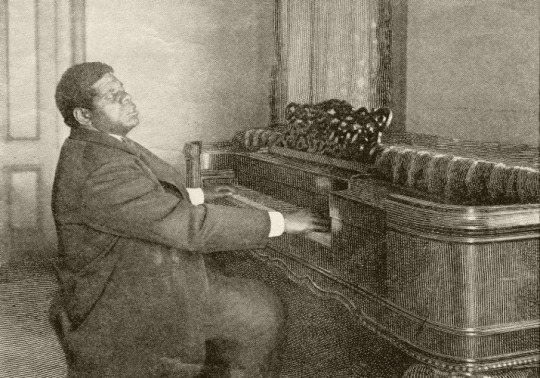
Blind Tom, who played before the crown heads of Europe
ca. 1875
engraving
From the collection of Bill Walton
So what of Tom’s life?
How was he treated by his society amidst all of this greatness they clearly saw in him?
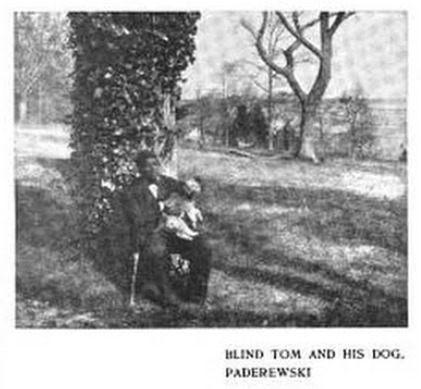
Blind Tom and his dog, Paderewski
Northern writer Rebecca Harding Davis reported in the Atlantic Monthly that there was a childishness about Tom that required coaxing and promises of cake and candy before he would perform.
She further quipped:
Some beautiful caged spirit, one could not but know, struggled for breath under that brutal form and idiotic brain.
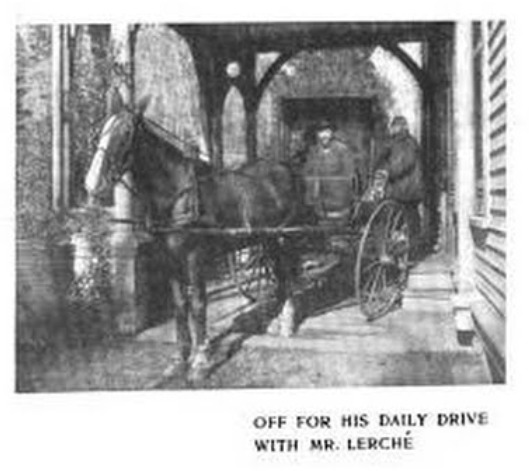
Off For His Daily Drive With Mr. Lerche
Renowned author Mark Twain attended many of Tom’s performances whenever he could. In 1969, after attending three concerts in a row, he wrote for the San Francisco Alta California newspaper:
"He lorded it over the emotions of his audience like an autocrat. He swept them like a storm, with his battle-pieces; he lulled them to rest again with melodies as tender as those we hear in dreams; he gladdened them with others that rippled through the charmed air as happily and cheerily as the riot the linnets make in California woods; and now and then he threw in queer imitations of the tuning of discordant harps and fiddles, and the groaning and wheezing of bag-pipes, that sent the rapt silence into tempests of laughter. And every time the audience applauded when a piece was finished, this happy innocent joined in and clapped his hands, too, and with vigorous emphasis."
He ended his article this way:
"Some archangel, cast out of upper Heaven like another Satan, inhabits this coarse casket; and he comforts himself and makes his prison beautiful with thoughts and dreams and memories of another time... It is not Blind Tom that does these wonderful things and plays this wonderful music--it is the other party."
You can read more of his impressions on Blind Tom here and here.
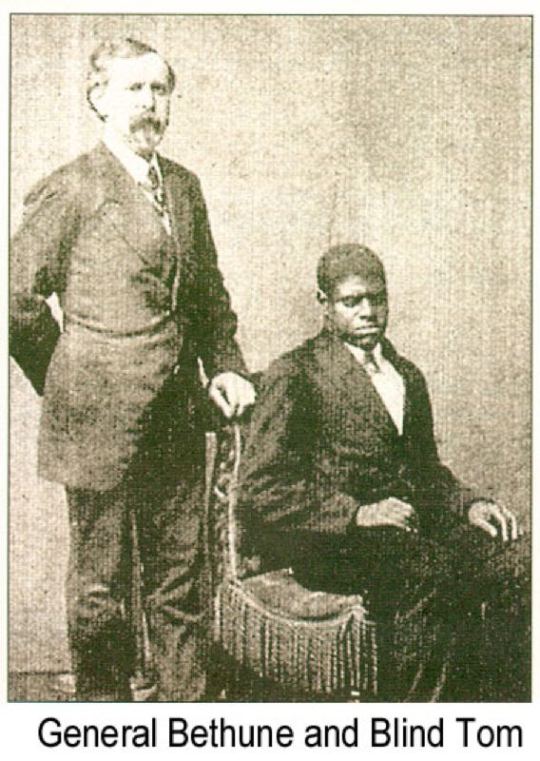
Pianist "Blind Tom" Thomas Wiggins and his owner General Bethune, taken before 1884
As the Civil War raged on, Blind Tom traveled with his master in the deep south to raise funds for the Confederate soldiers and their families. Bethune had two sons fighting for the Confederate cause. The conversations he heard about the conflict inspired Tom to compose the song “Battle of Manassas” in 1861.
youtube
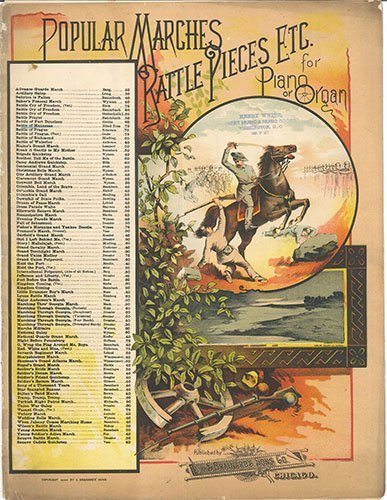
Tom's most famous piece, depicting an aural soundscape of a Civil War battle with patriotic favorites from the North and South
ca. 1884
Creator: S. Brainard's Sons Company
Source: Columbus Museum
http://columbusmuseum.pastperfectonline.com/webobject/EBDBDE0E-7C41-45D2-B66A-956431811890
As the southern rebellion was nearing its end, Tom improvised another battle tune “When This Cruel War is Over”. Perhaps this demonstrated his truest feelings about the Civil War at that moment in time.
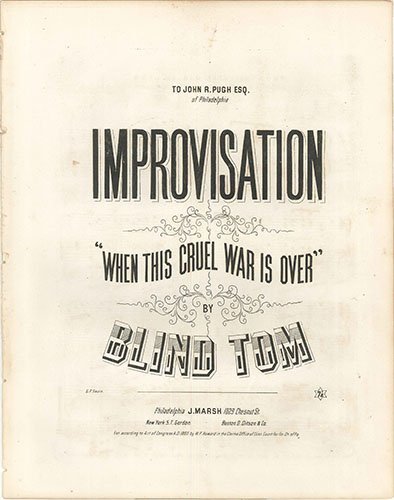
After the war, Wiggins' parents, who were basically illiterate, signed a five-year indenture agreement for James Bethune. In some places, it is mentioned that this was actually done in 1864 while they were still enslaved.
According to Researcher Barbara Schmidt:
Foreseeing that the South would soon fall to Union domination, General Bethune arranged for Domingo and Charity to sign a contract giving him management of Tom until he reached the age of twenty-one. Tom would receive food, shelter, musical instruction and an allowance of $20 a month. The surviving parents were to receive $500 a year plus food and shelter. Bethune would retain over ninety percent of the remaining profits from Tom's performances-- conservative estimates place that amount at $18,000 a year. After the War's end, Tom, who never knew he was free because he had never actually known he was a Negro slave, was launched upon another tour...
By 1879, Tom's concerts and sales of his sheet music were making Bethune around $20,000 every year, equivalent to more than $280,000 today. Tom, his mother, and the rest of his family actually received nothing.
During this time, a black entertainment promoter tried unsuccessfully to claim Tom from his “owner”.
Author Deirdre O'Connell has this to say:
Tom had no concept of money and was exploited, deceived, manipulated and robbed blind by his white masters and guardians. Emancipation failed to deliver him from the shackles of slavery. His master’s son – John Bethune - assumed the role of guardian and manager. In 1872, Tom was adjudged insane and the vast sums of money he earned (the equivalent of $5 million dollars today) was squandered on Bethune’s extravagant lifestyle. Then in 1884, Bethune was killed in a railroad accident. [By this time, it is estimated that Tom had earned over $750,000 for the Bethune family.]
At the time of his death John Bethune was embroiled in a bitter divorce. When his estranged wife, Eliza Bethune, discovered she was cut out of the will, she tracked down Tom’s impoverished mother and persuaded her to mount a legal challenge in New York. It took three years of legal wrangling, but in 1887, victory was theirs and ‘The Last American Slave’ – as the press dubbed Tom – was set free.
But Tom’s so-called ‘emancipation’ was little more than a sham. Once Charity naively handed Tom’s guardianship over to the Bethune’s widow, she was unceremoniously dumped and sent back to Georgia, never to see her son again.
Blind Tom’s final years were shrouded in secrecy and paranoia. It was widely believed he died in The Johnstown Flood of 1889, America’s biggest man-made disaster to date. In fact, he was in one of three places: touring the backwaters of North America, holed up in a New York apartment on the lower east side or listening to the ocean’s roar at Eliza Bethune’s country hideaway in wilds of New Jersey (purchased at his expense). In 1903 he made a brief comeback on the vaudeville stage.
In 1908, at the age of sixty, Blind Tom died of a stroke and was buried in an unmarked paupers grave in Brooklyn’s Evergreen Cemetery. Twenty years later, the daughter of his former master, Fanny Bethune, began efforts to disinter his body into the Bethune family plot in Georgia. A Columbus resident insisted he carried out her request as best he could, Jim Crow laws forcing him to re-bury Tom at a nearby plantation. The Evergreen Cemetery, however, had documents to prove that the body was never removed. Today, two plaques – one in Columbus Georgia, the other in Brooklyn - mark his burial place: a fitting end to the enigma of Blind Tom.
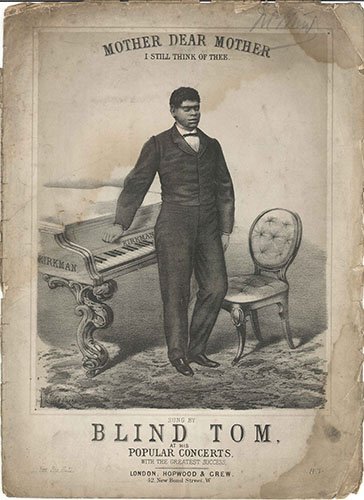
Mother, Dear Mother, I Still Think of Thee
ca. 1870
Creator: W.P. Howard (one of Tom’s piano teachers)
Source: Columbus Museum
http://columbusmuseum.pastperfectonline.com/webobject/D714C278-D0EB-4CF0-AFB0-323566192520
He was 59 when he passed away after 4 years of suffering from paralysis.
The account in the Ladies’ Journal says that apparently, a woman identified Tom as one of the victims of the Johnstown Flood and that individual was buried in Pennsylvania with an inscription identifying the person as such. That same article states that the author met with Tom after this time as “proof” that the inscription was wrong.
This writer also asserts that most people didn’t even know his real name and at the time they were writing in 1898, ‘the impression that he is dead is a pretty general one’ and yet ‘Blind Tom has never been ill a day in his life and is now enjoying an existence more full of comforts and happiness than fall to the lot of most mortals.”
He was living in what was describes as a ‘picturesque two-and-a-half-story wooden house with a broad veranda’ on the banks of the Shrewsbury River with an A. J. Lerche, who accompanied him as his guardian. Albert J. Lerche, a lawyer, was the husband of John Bethune’s widow after his death.
At this point in his life, it was noted he ‘never drinks, swears, nor shows any vicious inclinations.’
He is scrupulously neat, and most regular and methodical in his habits. He rises at seven, has breakfast at nine, dinner at half-past one, and supper at six. He goes to bed at a little after nine. He has an attendant who looks after him at mealtime, as he has to have his meat cut for him. He finds his napkin and tucks that in around his neck himself. He has a good appetite although by no means is he a heavy eater. He is fond of fruit—watermelons preferred—likes all kinds of pie except mince, and is very fond of sugar. He never drinks coffee. He is sensitive to cold. Sometimes when he feels a strong breeze blowing on him he will say: "Tom's in a draft. He may catch cold and die. Wouldn't that be terrible?" He has this artless fear of death, yet he has composed a funeral march for himself, in which there is one movement so cheerfujly bright as to be almost pathetic. This march was played at the funeral of his master, John G. Bethune ...
Tom is of a religious turn of mind. He will play only sacred music on Sunday. He says the Lord's * Prayer in his room aloud, and is fond of reciting passages from the Holy Scriptures, being especially fond of Saint Paul's Epistles to the Corinthians...
One pleasure which has a healthy side to it, and is in keeping with Blind Tom's cleanliness, is his daily bath in the Shrewsbury. In warm weather when the tidelis favorable, he dons his bathing suit, walks down to the shore from the house and ducks and paddles about and splashes in the water. He can take a few strokes, but he labors under the pleasing illusion that he is a peerless, longdistance swimmer. At first he did not take very kindly to this agreeable diversion, possibly because he felt unfamiliar with anything in the water, but he has come to be very fond of his bath, enjoying it hugely.
This ‘big, fleshy negro’ (listen to how stupid that sounds when you read it out loud) was 48 and his 'withered, wrinkled mammy’ was 85.
The headline for an obituary in the New York Times on June 15, 1908 read “BLIND TOM, PIANIST, DIES OF A STROKE - Old Negro with Strange Mastery of Music Ends His Days in Hoboken - A CHILD ALL HIS LIFE”
About half of the mixed gathering at his funeral, discussing his appearance, denied that the body in the casket was his.
Thomas Wiggins is memorialized with two tombstones, one in Brooklyn's Evergreen Cemetery and one in Midland, Georgia, near the land where he first began to play.
A historical marker near his supposed grave said that Wiggins was born in 1843.
As recorded in 1965, it read:
"BLIND TOM "
200 feet east is the grave of THOMAS WIGGINS,
(1843-1908). As "Blind Tom", he trilled
audiences, and in Europe with his remarkable
musical performances. Born a slave, his native
genius let him reproduce perfectly on the piano
any sound he heard, including classical compositions
and the songs of birds. His owners, the Bethune
family, discovered his rich gift when they heard
exquisite music in their home near Columbus and
found the little blind boy at the piano. He reached
the zenith of his fame on European tours during
which he played before royalty.
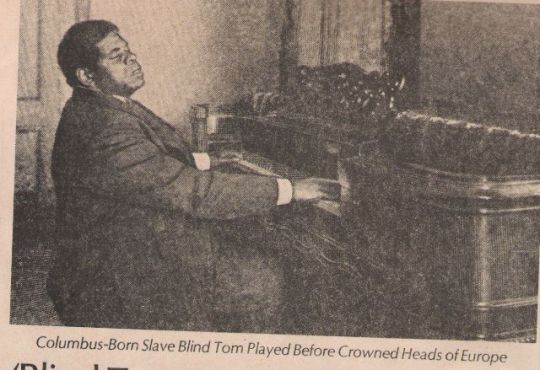
A newspaper clipping from page S-15 of the Ledger- Enquirer dated Sunday, April 23, 1978
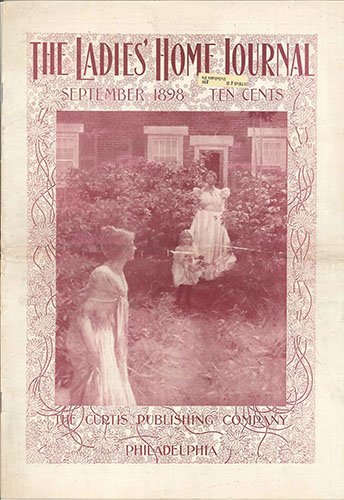
According to the volume 15 of the Ladies’ Home Journal published in 1898, Tom is playing ‘Something That The Birds And Wind Told Him’ in this Photograph by A. J. Lerche.

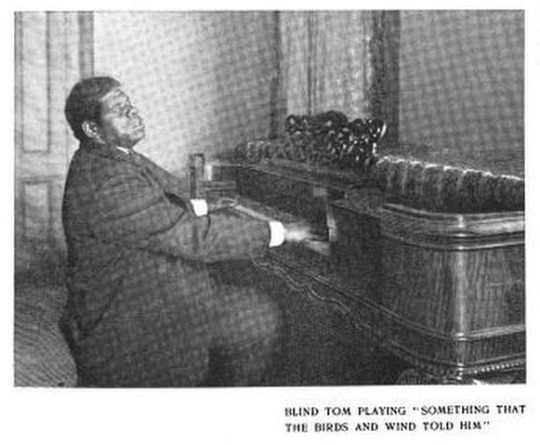
Only about 100 people in recorded medical history had “savant syndrome.” Another well-known individual who had talents comparable to Blind Tom was Leslie Lemke. You can read about him here.
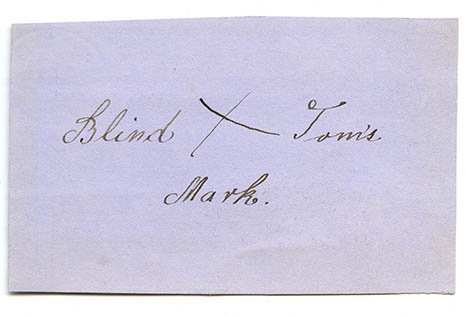
"Blind Tom" Wiggins' mark verified by his mother
ca. 1898
Source: Columbus Museum
http://columbusmuseum.pastperfectonline.com/webobject/E71ADDF3-0872-4D5F-A623-965018335811
References:
http://files.usgwarchives.net/ga/muscogee/photos/wiggins12644gph.txt
http://www.blindtom.org/#/who-was-blind-tom/
https://www.wisconsinmedicalsociety.org/professional/savant-syndrome/profiles-and-videos/profiles/blind-tom-a-19th-century-marvelous-musician/
http://www.twainquotes.com/archangels.html
http://nmaahc.tumblr.com/post/124184323625/five-you-should-know-african-americans
You can find sheet music for Blind Tom’s compositions here:
http://www.blindtom.org/sheet-music/
youtube
#blackhistory#blindtom#slavery#black art#black music#thomas wiggins#autism#black autism#mental disorders#mental health#black mental health#american history#u.s. history#blind#blindness#genius#child prodigy#Barnum#slave#piano#mozart#beethoven#mentally challenged
0 notes